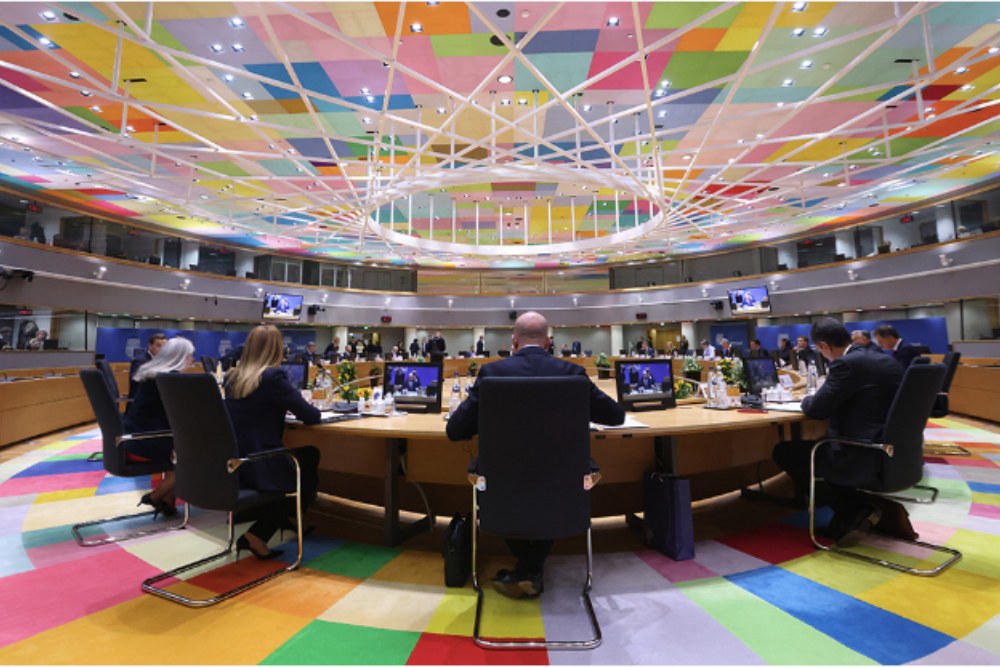Today member states’ representatives to the Council (Coreper) confirmed the provisional agreement between the Spanish presidency of the Council and the European Parliament on an update of an EU law that deals with legal migration to the EU labour market.
The updated rules streamline the procedure to apply for a permit to reside for the purpose of work in the territory of a member state. This will give a boost to international recruitment of talent. In addition, more rights for third-country workers and their equal treatment compared to EU workers will reduce labour exploitation.

Many employers are facing a tense labour market situation. The proposal we have agreed on today is a response to this
situation of shortages as it will result in a smooth and predictable process for third-country nationals to apply for work and residence permit in one go.Elma Saiz, Spanish Minister for the inclusion, Social security and migration
Elma Saiz, Spanish Minister for the inclusion, Social security and migration
The single permit directive sets out the application process for EU countries to issue this single permit and establishes common rights for workers from third countries. Member states keep the final say about which and how many third-country workers they want to admit to their labour market.
Application procedure
A third-country worker can submit an application from the territory of a third-country or, according to the agreement reached between the co-legislators, from within the EU if he or she is a holder of a valid residence permit. When a member state decides to issue the single permit this decision will serve both as residence and as work permit.
Duration
The Council and European Parliament decided that issuing a single permit should be made within three months after receipt of the complete application. This period also covers the time needed to check the labour market situation before a decision on the single permit is adopted. Member states will then issue the requisite visa to allow initial entry into their territory.
Change of employer
Single permit holders will have the possibility to change employer, subject to a notification to the competent authorities. Member states may also require a minimum period of time during which the single permit holder is required to work for the first employer. In case of loss of employment, third-country workers are allowed to remain in the territory of the member state if the total period of unemployment does not exceed three months during the validity of the single permit or six months after two years of the permit.
Background and next steps
The current single permit directive dates back to 2011. On 27 April 2022, the Commission proposed an update of the 2011 directive.
The proposal is part of the ‘skills and talent’ package which addresses the shortcomings of the EU as regards legal migration and has as objective to attract the skills and talent the EU needs.
Eurostat data from 2019 show that 2 984 261 single permit decisions were reported by member states of which 1 212 952 were for issuing first permits. The other decisions were for renewing or changing permits.
Following today’s approval, the text will now have to be formally adopted by both the Council and European Parliament.














 English
English French
French Spanish
Spanish German
German Dutch
Dutch Italian
Italian Danish
Danish Portuguese
Portuguese Greek
Greek Russian
Russian Swedish
Swedish Bulgarian
Bulgarian Hungarian
Hungarian Catalan
Catalan Ukrainian
Ukrainian Polish
Polish Basque
Basque Chinese (Simplified)
Chinese (Simplified) Japanese
Japanese Hebrew
Hebrew Arabic
Arabic Swahili
Swahili Amharic
Amharic Irish
Irish Afrikaans
Afrikaans Albanian
Albanian Armenian
Armenian Azerbaijani
Azerbaijani Belarusian
Belarusian Bengali
Bengali Bosnian
Bosnian Cebuano
Cebuano Chichewa
Chichewa Chinese (Traditional)
Chinese (Traditional) Corsican
Corsican Croatian
Croatian Czech
Czech Esperanto
Esperanto Estonian
Estonian Filipino
Filipino Finnish
Finnish Frisian
Frisian Galician
Galician Georgian
Georgian Gujarati
Gujarati Haitian Creole
Haitian Creole Hausa
Hausa Hawaiian
Hawaiian Hindi
Hindi Hmong
Hmong Icelandic
Icelandic Igbo
Igbo Indonesian
Indonesian Javanese
Javanese Kannada
Kannada Kazakh
Kazakh Khmer
Khmer Korean
Korean Kurdish (Kurmanji)
Kurdish (Kurmanji) Kyrgyz
Kyrgyz Lao
Lao Latin
Latin Latvian
Latvian Lithuanian
Lithuanian Luxembourgish
Luxembourgish Macedonian
Macedonian Malagasy
Malagasy Malay
Malay Malayalam
Malayalam Maltese
Maltese Maori
Maori Marathi
Marathi Mongolian
Mongolian Myanmar (Burmese)
Myanmar (Burmese) Nepali
Nepali Norwegian
Norwegian Pashto
Pashto Persian
Persian Punjabi
Punjabi Romanian
Romanian Samoan
Samoan Scottish Gaelic
Scottish Gaelic Serbian
Serbian Sesotho
Sesotho Shona
Shona Sindhi
Sindhi Sinhala
Sinhala Slovak
Slovak Slovenian
Slovenian Somali
Somali Sundanese
Sundanese Tajik
Tajik Tamil
Tamil Telugu
Telugu Thai
Thai Turkish
Turkish Urdu
Urdu Uzbek
Uzbek Vietnamese
Vietnamese Welsh
Welsh Xhosa
Xhosa Yiddish
Yiddish Yoruba
Yoruba Zulu
Zulu